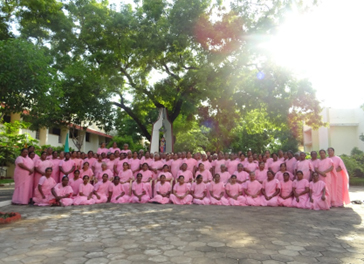OUR IDENTITY
The legacy of our Congregation is the basis for our identity. Yet, as the world keeps changing and as new needs emerge in the society where we are placed, we seek to make our methods creative, competent, and communitarian. The spirit of our commitment is generative and empowering the weak. We inherit these characteristics from our Foundress Mother Thatipathri Gnanamma who listened to the cry of the illiterate women of Kilacheri and wiped away their tears by her spontaneous and liberating response. She was solely inspired by the Spirit of the Lord who carried the cross to free the oppressed.
As needs expand, we continue to respond to the challenges of the times with trust and courage. We reclaim and confirm the core values that form the identity of our Congregation in our life and mission.
Sensitive towards reality
We are sensitive to the cry of the people by being rooted in the Charism of the Congregation and guided by the vision of our Foundress. Our God is a God who hears the cries of the people and takes sides with them in their struggle. It is He who sees, hears, and feels the pain of the people and acts to deliver them, calling the people both to announce God’s intervention and to share that pain together with God. Hence, our mission is to respond to the suffering of a people who struggle to achieve justice. Through our union with the Lord Jesus Christ, we are emboldened to act to alleviate the people’s suffering.
We realize that we should make our religious life relevant in the age of secularization of sacred lives. The world is changing apace. Technology moved lives and human activities rapidly. Media changed the ways people live their lives. The onslaught of advertisements and cinematic visual culture overwhelmed all that we cherish as tradition, culture and value system. In this context, we were called to make our life count. That relevance could come only by evolving a Christian counter - culture to stand up to consumer culture. We became women on the move, ready to go anywhere in the world like the disciples who were sent out by Jesus.
Welcoming the changes
Creativity becomes the basis of our being and doing. We make a deep commitment to creative changes. This approach and drive are based on our Foundress who wanted to transcend the reality of Kilacheri in 1880s. She wanted to transform the girls to make them go beyond their homes and change their life of slavery into one of freedom. If we refuse to go beyond the life and mission in which we are involved now, we will defeat the very purpose of the founding of the Congregation. The change we cause in the lives of people is creative. This creativity refers to generating life in the places where culture of death once prevailed. We focus on the positive dimension of life - giving activities. Wherever we go, we enter the lives of the people who are gripped by death and darkness. Apart from our own skills, we become persons who create life in death, effect light in darkness, promote peace in conflict, and promote knowledge removing ignorance.
The fundamental characteristics of our identity as the Sisters of St.Anne - Madras
01. Rootedness

Rootedness explicitly refers to our Charism “Fullness in God”. Christ found unique fullness in the Father and fully manifested Him in his life said, “I am in the Father and the Father is in me” (Jn 14:10). We find fullness in God by living in Abba consciousness. Our roots are in the original Charism of our Congregation that we are women who vow to lead a consecrated life that is rooted in the fullness in God and service in simplicity.
“Fullness in God” is our vision and “Service in simplicity” is our mission. ‘Fullness’ means our total communion with God that makes us feel the presence of God which we can experience in our thoughts, feelings, words and deeds. This communion flows into service in simplicity that makes us commit to the liberation of women. We participate in their struggle through educating them to become masters of their own life, and by doing so we help them free from being the objects of wickedly manipulative structures of the society at large.
02. Involvement
“Service in simplicity” exhorts us to move towards total involvement in our ministries. The rootedness in the charism impels us and sensitizes to the cry of the people, especially women, who struggle daily to free themselves from the chains of domination and manipulation. This listening to the cry is not simply hearing the sound of the crying, but means 'feeling into the people (empathy) who suffer and who are in need of our service. 'This involves more our heart (our emotions), than our head (our intellect).
In our solidarity with the poor, we enter into their world by experiencing the suffering with them.We discern and analyze the situation and guide people to take up joint action to challenge the structural injustice. We defend and empower those who are denied full human dignity. We may have to take a life-long effort with no guarantee of short-term success. Our every effort springs from the depths of the heart that connects us with the people emotionally. This is the way Mother Gnanamma felt the pain in her heart of the girls and women of Kilacheri village that guided her to found the Congregation.
